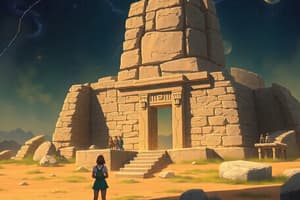Podcast
Questions and Answers
What is an archaeological site?
What is an archaeological site?
- A place where animals were hunted
- A place where evidence of past activity is preserved (correct)
- A place where people currently live
- A place where plants were grown
What can an archaeological site represent?
What can an archaeological site represent?
- A part of the archaeological record (correct)
- A current settlement
- A natural landmark
- A place of worship
What factors can influence the definition and geographical extent of a site?
What factors can influence the definition and geographical extent of a site?
- The size of the settlement
- The type of artifacts found
- The period studied (correct)
- The type of soil
What is one method of finding archaeological sites?
What is one method of finding archaeological sites?
What is geophysics in archaeology?
What is geophysics in archaeology?
What is a GIS in archaeology?
What is a GIS in archaeology?
How are sites traditionally distinguished?
How are sites traditionally distinguished?
What can buried cultural remnants indicate?
What can buried cultural remnants indicate?
What is true about many archaeological sites?
What is true about many archaeological sites?
Flashcards
Archaeological Site
Archaeological Site
A location containing evidence of past human activities.
Archaeological Record
Archaeological Record
A collection of physical remains related to past human behavior.
Period Studied
Period Studied
The time period archaeologists are interested in examining.
Surveys
Surveys
Signup and view all the flashcards
Geophysics
Geophysics
Signup and view all the flashcards
GIS (Geographic Information System)
GIS (Geographic Information System)
Signup and view all the flashcards
Artifacts
Artifacts
Signup and view all the flashcards
Features
Features
Signup and view all the flashcards
Buried Cultural Remnants
Buried Cultural Remnants
Signup and view all the flashcards
Study Notes
Archaeological Site: A Summary
- An archaeological site is a place where evidence of past activity is preserved.
- The site can be prehistoric or historic, and it represents a part of the archaeological record.
- The definition and geographical extent of a site can vary widely depending on the period studied and the theoretical approach of the archaeologist.
- It is difficult to delimit a site, and it can indicate a settlement of some sort.
- Surveys are one way to find sites, and it involves walking around analyzing the land looking for artifacts.
- Field surveys can also involve digging, and archaeologists sample randomly within a given area of land as another form of conducting surveys.
- Geophysics is a branch of survey becoming more and more popular in archaeology, which uses different types of instruments to investigate features below the ground surface.
- Archaeologists make maps by taking data from surveys or archival research and plugging it into a Geographical Information System (GIS).
- Traditionally, sites are distinguished by the presence of both artifacts and features.
- Different archaeologists may see an ancient town and its nearby cemetery as being two different sites or part of the same wider site.
- Cultural remnants which have been buried by sediments are in many environments more likely to be preserved than exposed cultural remnants.
- Many sites are the subject of ongoing excavation or investigation.
Studying That Suits You
Use AI to generate personalized quizzes and flashcards to suit your learning preferences.




